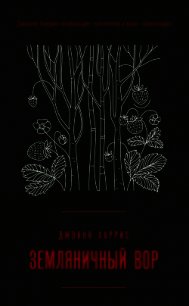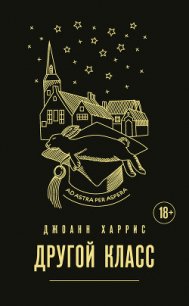Шоколад / Chocolat - Харрис Джоанн (читать бесплатно книги без сокращений .txt) 📗
No answering smile, but a nod, as of one businessman to another. The coin was warm and a little sticky. He took the packet with care.
“I like the little gingerbread house,” he said gravely. “In the window.”
In the doorway the three others nodded shyly, pressing together as if to give themselves courage.
“It’s cool.”
The American word was uttered with a kind of defiance, like smoke from a secret cigarette. I smiled.
“Very cool,” I agreed. “If you like, you and your friends can come over and help me eat it where I take it down.”
Eyes widened.
“Cool!”
“Hypercool”
“When?”
I shrugged.
“I’ll tell Anouk to remind you,” I told them. “That’s my little girl.”
“We know. We saw her. She doesn’t go to school.”
This last was uttered with some envy…
“She will on Monday. It’s a pity she doesn’t have any friends yet, because I told her she could ask them over. You know, to help me with the displays.”
Feet shuffled, sticky hands held out, shoving and pushing to be first in line.
“We can”
“I can-”
“I’m Jeannot ”
“Claudine-”
“Lucie.”
I sent them out with a sugar mouse each and watched them fan across the square like dandelion seeds in the wind. A slice of sunlight glanced off their backs one after the other as they ran – red-orange-green-blue – then they were gone. From the shaded arch of St Jeromes I saw the priest, Francis Reynaud, watching them with a look of curiosity and, I thought, disapproval. I felt a moment’s surprise. Why should he disapprove? Since his duty visit on our first day he has not called again, though I have heard of him often from other people. Guillaume speaks of him with respect, Narcisse with temper, Caroline with that archness which I sense she adopts when speaking of any man under fifty. There is little warmth in their speech. He is not a local, I understand. A Paris seminarian, all his learning from books he does not know the land, its needs, its demands. This from Narcisse, who has had a running feud with the priest ever since he refused to attend Mass during the harvesting season. A man who does not suffer fools, says Guillaume, with that small gleam of humour from behind his round spectacles, that is to say so many of us, with our foolish little habits and our unbreakable routines. He pats Charly’s head affectionately as he says it, and the dog gives his single, solemn bark.
“He thinks it’s ridiculous to be so devoted to a dog,” said Guillaume ruefully. “He’s far too polite to say so, but he thinks it’s inappropriate. A man of my age…”
Before his retirement Guillaume was a master at the local school. There are only two teachers there now to deal with the falling numbers, though many of the older people still refer to Guillaume as le maitre d’ecole. I watch as he scratches Charly gently behind the ears, and I am sure I sense the sadness I saw in him at the carnival; a furtive look which is almost guilt.
“A man of any age can choose his friends where he likes,” I interrupted with some heat. “Perhaps monsieur le cure could learn a few things from Charly himself.”
Again that sweet, sad almost-smile.
“Monsieur le cure tries his best,” he told me gently. “We should not expect more.”
I did not answer. In my profession it is a truth quickly learned that the process of giving is without limits. Guillaume left La Praline with a small bag of florentines in his pocket; before he had turned the comer of Avenue des Francs Bourgeois I saw him stoop to offer one to the dog. A pat, a bark, a wagging of the short stubby tail. As I said, some people never have to think about giving.
The village is less strange to me now. Its inhabitants too. I am beginning to know faces, names; the first secret skeins of histories twisting together to form the umbilical which will eventually bind us. It is a more complex place than its geography at first suggests, the Rue Principale forking off into a hand-shaped branch of laterals – Rue des Poetes, Avenue des Francs Bourgeois, Ruelle des Freres de la Revolution – someone amongst the town planners had a fierce republican streak: My own square, Place Saint-Jerome, is the culmination of these reaching fingers, the church standing white and proud in an oblong of linden trees, the square of red shingle where the old men play petanque on fine evenings: Behind it, the hill falls away sharply towards that region of narrow streets collectively called Les Marauds.
This is Lansquenet’s tiny slum, close half-timbered houses staggering down the uneven cobbles towards the Tannes. Even there it is some distance before the houses give way to marshland; some are built on the river itself on platforms of rotting wood, dozens flank the stone embankment, long fingers of damp reaching towards their small high windows from the sluggish water. In a town like Agen, Les Marauds would attract tourists for its quaintness and rustic decay. But here there are no tourists. The people of Les Marauds are scavengers, living from what they can reclaim from the river. Many of their houses are derelict; elder trees grow from the sagging walls.
I closed La Praline for two hours at lunch and Anouk and I went walking down towards the river. A couple of skinny children dabbled in the green mud by the waterside; even in February there was a mellow stink of sewage and rot. It was cold but sunny, and Anouk was wearing her red woollen coat and hat, racing along the stones and shouting to Pantoufle scampering in her wake. I have become so accustomed to Pantouffe – and to the rest of the strange menagerie which she trails in her bright wake – that at such times I can almost see him clearly; Pantoufle with his grey-whiskered face and wise eyes, the world suddenly brightening as if by a strange transference I have become Anouk, seeing with her eyes, following where she travels. At such times I feel I could die for love of her, my little stranger; my heart swelling dangerously so that the only release is to run too, my red coat flapping around my shoulders like wings, my hair a comet’s tail in the patchy blue sky.
A black cat crossed my path and I stopped to dance around it widdershins and to sing the rhyme:
Ou va-t-i, mistigri?
Passe sans faire de mal ici.
Anouk joined in and the cat purred, rolling over into the dust to be stroked. I bent down and saw a tiny old woman watching me curiously from the angle of a house. Black skirt, black coat, grey hair coiled and plaited into a neat, complex bun. Her eyes were sharp and black as a bird’s. I nodded to her.
“You’re from the chocolaterie,” she said.
Despite her age which I took to be eighty, maybe more – her voice was brisk and strongly accented with the rough lilt of the Midi.
“Yes, I am.”
I gave my name.
“Armande Voizin,” she said. “That’s my house over there.” She nodded towards one of the river-houses, this one in better repair than the rest, freshly whitewashed and with scarlet geraniums in the window boxes. Then, with a smile which worked her apple-doll face into a million wrinkles, she said, “I’ve seen your shop. Pretty enough, I’ll grant you that, but no good to folks like us. Much too fancy.” There was no disapproval in her voice as she spoke, but a half laughing fatalism. “I hear our m’sieur le cure already has it in for you,” she added maliciously. “I suppose he thinks a chocolate shop is inappropriate in his square.” She gave me another of those quizzical, mocking glances. “Does he know you’re a witch?” she asked.
Witch, witch. It’s the wrong word, but I knew what she meant.




